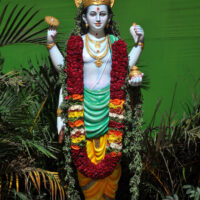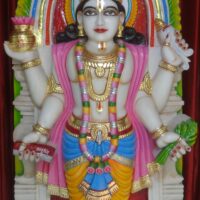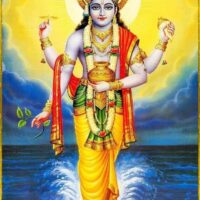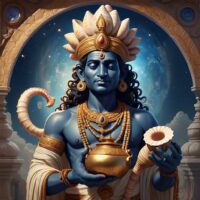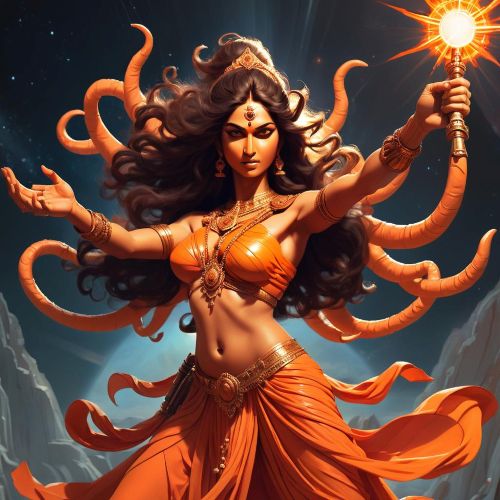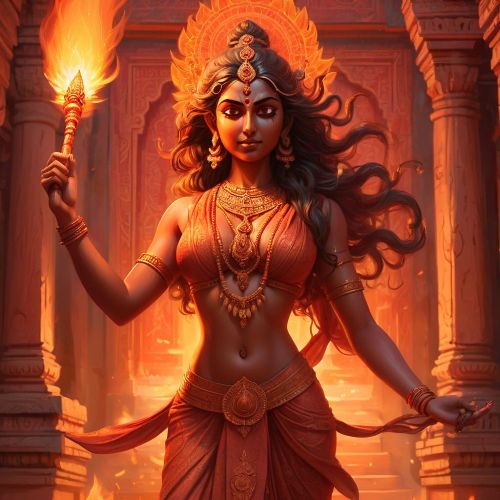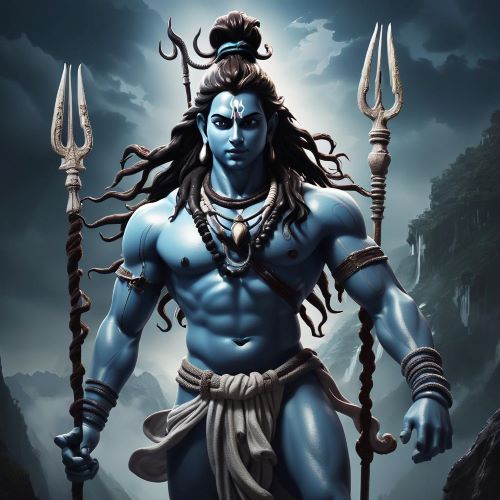Dhanvantari : God of Ayurveda
Listen
At a glance
| Description | |
|---|---|
| Origin | Indian Mythology |
| Classification | Gods |
| Family Members | Dirghatamas (Father) |
| Region | India |
| Associated With | Medicine, Ayurveda |
Dhanvantri
Introduction
Dhanvantari is celebrated in Hindu mythology as the divine physician and the guardian of health, wellness, and longevity. Revered as the god of medicine, he is closely linked to Ayurveda, India’s traditional system of healing, which continues to influence medical practices worldwide. His mythological origin is deeply tied to the legendary event of Samudra Manthan, or the churning of the cosmic ocean, where he emerged holding the pot of Amrita, the nectar of immortality. This episode not only secured his role as the protector of life but also placed him among the most enduring symbols of holistic healing. Considered an incarnation of Vishnu, Dhanvantari represents the divine integration of health, spirituality, and science, and is still worshipped by practitioners of Ayurveda and devotees seeking physical and spiritual wellness.
Physical Traits
The iconography of Dhanvantari is rich with symbolism that reflects his divine role as a healer. He is typically portrayed as a youthful, radiant figure exuding vitality and well-being. His blue or golden complexion, often reminiscent of Vishnu, emphasizes his celestial origin. With four arms, Dhanvantari carries sacred objects that embody the essence of his healing powers: the pot of Amrita, symbolizing immortality; the conch shell, representing purity and divine sound; the chakra, a sign of cosmic energy and protection; and the leech or medicinal herb, indicating his association with ancient medical practices. In some depictions, he is shown standing gracefully on a lotus, an emblem of purity and transcendence. His regal attire, adorned with jewels and divine ornaments, reinforces his divine status while highlighting the majesty of his presence in Hindu worship and iconography.
Family
Dhanvantari’s family connections vary across different traditions, intertwining myth and history. In one account, he is described as the son of King Dirghatamas of Kashi, symbolizing his link to earthly royalty while retaining his divine identity. Some versions describe him as being born into the royal lineage of Kashi to fulfill a divine purpose: the propagation of Ayurveda for human benefit. Another interpretation identifies Divodasa of Kashi as an earthly manifestation of Dhanvantari, a ruler who became a renowned teacher of Ayurveda and the mentor of the legendary physician Sushruta, credited with pioneering surgical practices. This dual narrative of divine emergence from the cosmic ocean and human birth into a royal family reflects the complex layers of his mythology, uniting the celestial with the terrestrial. Through these stories, Dhanvantari is both a god and a teacher, embodying the seamless flow of sacred wisdom into human life.
Other names
Over centuries, Dhanvantari has been revered under various names and epithets, each emphasizing a unique aspect of his divine identity. Known as the Vaidya-Raja, or the King of Physicians, he is also hailed as Ayurveda Purusha, the very embodiment of the Ayurvedic system. In his role as the bearer of nectar, he is referred to as Amrita-Dhara, while as an incarnation of Vishnu he is invoked as Vishnu-Dhanvantari. Ancient scriptures also connect him with titles such as Kantatman and even link him with sages like the Siddhars, highlighting his role across spiritual traditions. In some traditions, his name overlaps with figures such as Divodasa, underscoring the blurred lines between his divine and earthly manifestations. Devotees also chant his 108 names, which describe his attributes, including Vishnave, Lakshmipataye, Krishnaya, and Parabrahmane. These names not only reinforce his identity as a healer but also place him within the wider pantheon of Vishnu’s incarnations.
Powers and Abilities
As the divine physician, Dhanvantari embodies a unique blend of mythological powers and practical knowledge that forms the cornerstone of Ayurveda. His most celebrated gift is the Amrita, the nectar of immortality, which symbolizes his role as a giver of longevity and vitality. Beyond myth, he is revered for imparting the comprehensive science of Ayurveda, covering eight distinct branches: internal medicine, pediatrics, psychiatry, ENT and ophthalmology, surgery, toxicology, geriatrics, and therapies for male infertility. Ancient Ayurvedic texts attribute to him knowledge of surgical procedures such as rhinoplasty, stone extraction, suturing, and removal of foreign bodies, making him not just a divine figure but also a pioneer in medical practice. Dhanvantari is also believed to have discovered the medicinal properties of herbs like turmeric and salt, highlighting his role in preventive medicine. His abilities transcend physical healing, extending into the spiritual domain where invoking his blessings is thought to shield devotees from epidemics, misfortune, and chronic illnesses.
Modern Day Influence
The relevance of Dhanvantari extends far beyond mythology, shaping modern healthcare, spirituality, and cultural practices. In India, he is worshipped as the patron deity of Ayurveda practitioners, and his image adorns clinics, hospitals, and medical institutions as a symbol of divine healing. His birth anniversary, celebrated as Dhanvantari Jayanti or Dhanteras, is observed just before Diwali, honoring his emergence with the nectar of immortality. The Government of India has also declared this day as National Ayurveda Day, reinforcing his importance in preserving traditional medicine in the modern era. Globally, as Ayurveda gains popularity as an alternative and holistic system of health, Dhanvantari’s teachings on preventive care, natural remedies, and balance in life resonate with contemporary wellness movements. His legacy has been embraced in yoga therapy, naturopathy, and integrative medicine, bridging the gap between science and spirituality. Temples dedicated to him in states like Tamil Nadu and Kerala draw devotees seeking relief from illness, while digital platforms and wellness retreats reinterpret his wisdom for modern audiences. Today, Dhanvantari’s presence is a reminder that the pursuit of health is both a sacred and scientific journey, making him as relevant now as he was in ancient times.
Related Images
Source
Britannica. (2025, July 14). Dhanvantari | God of Medicine, Ayurveda & Healing. https://www.britannica.com/topic/Dhanvantari
Desi Souls. (2025, July 10). Dhanvantari Idol: A Divine Symbol Of Health And Healing. https://desisouls.in/blog/dhanvantari-idol/?srsltid=AfmBOopmnDws49htgGyGqhTo57_svVldhA3PjLviqR0mKvf_bbA_AiFY
Doctorrekha.com. (2024, October 10). Lord Dhanvantari: The God of Ayurveda. https://doctorrekha.com/lord-dhanvantari/
Dravinashtank.in. (2023, November 5). Dhanvantari: The Divine Healer – God of Health and Healing. https://dravinashtank.in/festival/dhanvantari-the-divine-healer-god-of-health-and-healing/
Easyayurveda.com. (2016, September 12). Lord Dhanwantari ‘The God of Ayurveda’. https://www.easyayurveda.com/2016/09/12/lord-dhanwantari-the-god-of-ayurveda/
Hindu Culture Hub. (n.d.). Unveiling the Divine: The Mystical Significance of Dhanvantari. https://hinduculturehub.com/gods-goddesses/dhanvantari/
Hinduism StackExchange. (2015, November 7). What is the story of Dhanvantari, the incarnation of Vishnu?. https://hinduism.stackexchange.com/questions/9369/what-is-the-story-of-dhanvantari-the-incarnation-of-vishnu
Historyofayurveda.org. (2018, April 20). Who was Dhanvantari? Why is he important in Ayurveda?. https://www.historyofayurveda.org/library/who-was-dhanvantari-why-is-he-important-in-ayurveda
Ivyingram.com. (2011, January 11). Lord Dhanvantari, god of healing – Ivy Ingram, MA, AP. https://ivyingram.com/2011/01/11/lord-dhanvantari-god-of-healing/
Keralatourism.org. (n.d.). Dhanwantari – History of Ayurveda – Kerala Tourism. https://www.keralatourism.org/ayurveda/history/mythology-origin/sages/dhanwantari
SDM Ayurveda College Udupi. (2019, August 18). The legend of Dhanvantari. https://sdmayurvedacollegeudupi.in/the-legend-of-dhanvantari/
Study.com. (n.d.). Dhanvantari Legend, Symbols & Temples – Study.com. https://study.com/academy/lesson/dhanvantari-overview-legend-temples.html
Timesofindia.indiatimes.com. (2023, November 9). Lord Dhanvantri: Know everything about God of Ayurveda. https://timesofindia.indiatimes.com/religion/hindu-mythology/lord-dhanvantri-know-everything-about-god-of-ayurveda/articleshow/105092203.cms
Vital Veda. (n.d.). Dhanvantari 108 Names (Astotram) | Learn. https://www.vitalveda.com.au/learn/108-names-dhanvantari/
Wikipedia. (n.d.). Dhanvantari – Wikipedia. https://en.wikipedia.org/wiki/Dhanvantari
Wisdomlib.org. (2025, July 30). Dhanvantari: Significance and symbolism. https://www.wisdomlib.org/concept/dhanvantari
Frequently Asked Questions
What is lorem Ipsum?
I am text block. Click edit button to change this text. Lorem ipsum dolor sit amet, consectetur adipiscing elit. Ut elit tellus, luctus nec ullamcorper mattis, pulvinar dapibus leo.
What is lorem Ipsum?
I am text block. Click edit button to change this text. Lorem ipsum dolor sit amet, consectetur adipiscing elit. Ut elit tellus, luctus nec ullamcorper mattis, pulvinar dapibus leo.
What is lorem Ipsum?
I am text block. Click edit button to change this text. Lorem ipsum dolor sit amet, consectetur adipiscing elit. Ut elit tellus, luctus nec ullamcorper mattis, pulvinar dapibus leo.
What is lorem Ipsum?
I am text block. Click edit button to change this text. Lorem ipsum dolor sit amet, consectetur adipiscing elit. Ut elit tellus, luctus nec ullamcorper mattis, pulvinar dapibus leo.
What is lorem Ipsum?
I am text block. Click edit button to change this text. Lorem ipsum dolor sit amet, consectetur adipiscing elit. Ut elit tellus, luctus nec ullamcorper mattis, pulvinar dapibus leo.


